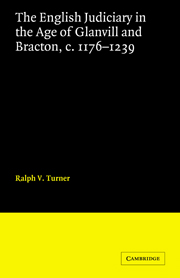Book contents
- Frontmatter
- Contents
- Acknowledgements
- Abbreviations
- 1 THE REPUTATION OF THE ROYAL JUSTICES
- 2 GLANVILL AND HIS COLLEAGUES, c. 1176–89
- 3 THE ORIGINS OF A PROFESSIONAL JUDICIARY IN THE REIGN OF RICHARD I
- 4 KING JOHN'S CORPS OF JUSTICES
- 5 PATTISHALL, RALEIGH AND THEIR COLLEAGUES
- 6 THE WORK OF THE JUSTICES
- Conclusion: The judges and their critics
- Appendix: Royal justices, c. 1176–1239
- Manuscript sources
- Index
- CAMBRIDGE STUDIES IN ENGLISH LEGAL HISTORY
6 - THE WORK OF THE JUSTICES
Published online by Cambridge University Press: 07 October 2011
- Frontmatter
- Contents
- Acknowledgements
- Abbreviations
- 1 THE REPUTATION OF THE ROYAL JUSTICES
- 2 GLANVILL AND HIS COLLEAGUES, c. 1176–89
- 3 THE ORIGINS OF A PROFESSIONAL JUDICIARY IN THE REIGN OF RICHARD I
- 4 KING JOHN'S CORPS OF JUSTICES
- 5 PATTISHALL, RALEIGH AND THEIR COLLEAGUES
- 6 THE WORK OF THE JUSTICES
- Conclusion: The judges and their critics
- Appendix: Royal justices, c. 1176–1239
- Manuscript sources
- Index
- CAMBRIDGE STUDIES IN ENGLISH LEGAL HISTORY
Summary
THE JUSTICES' MENTALITY
The judges of the Angevin kings – except for Richard fitz Neal and the authors of Glanvill and Bracton – wrote little that might cast light on their feelings about their work. The earliest surviving letters of royal justices date from Henry III's early years. They were hardworking royal servants with little time and probably little inclination for reflection or writing. We have seen that at least half the justices were laymen, whose training in the law was primarily practical. Ten of the clerks among the judiciary had some higher education, seen by their title of magister; but evidence for law degrees is extremely thin. It is only certain that one, Richard Barre, studied at Bologna, although Bracton is evidence that justices in William of Raleigh's circle were accomplished Romanists.
Medieval judges were not required to give reasoned judgments, and the plea rolls rarely record principles of jurisprudence, for most cases concluded with a jury's verdict, a statement of fact, or with ‘wager of law’ or compurgation, not with a judge's authoritative statement. Royal justices did pronounce the law, however, on procedural matters or in spheres where the law was uncertain. Glanvill notes instances in which judgment could be made de consilio curie ex equitate, and Bracton discusses questions where there was contentio inter maiores. Decisions on procedure were often decided ‘by counsel of the court’, and the judges' decisions generally aimed at rational resolution of the problem with concern for the convenience of the parties.
- Type
- Chapter
- Information
- Publisher: Cambridge University PressPrint publication year: 1985

